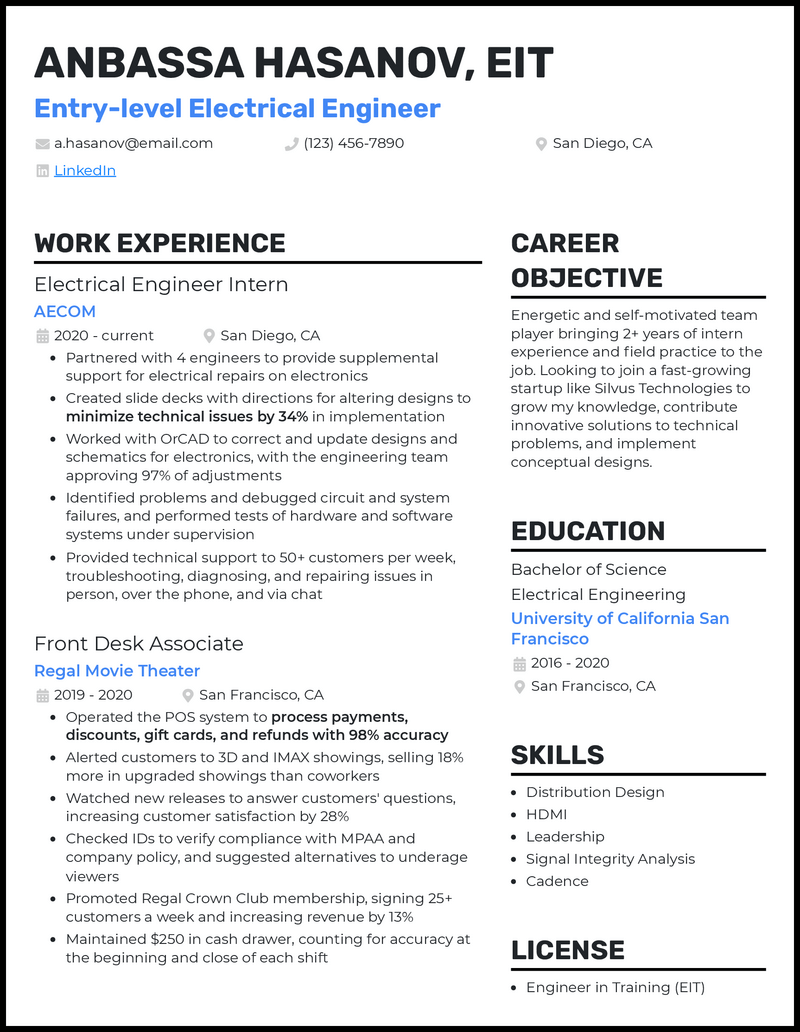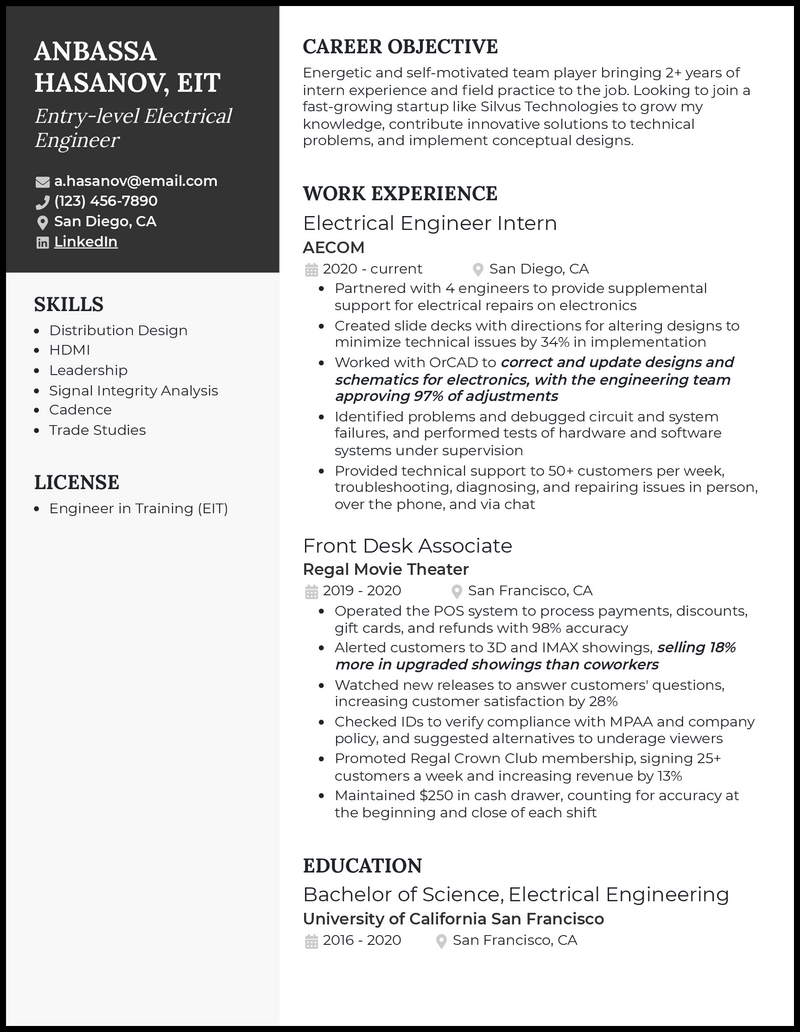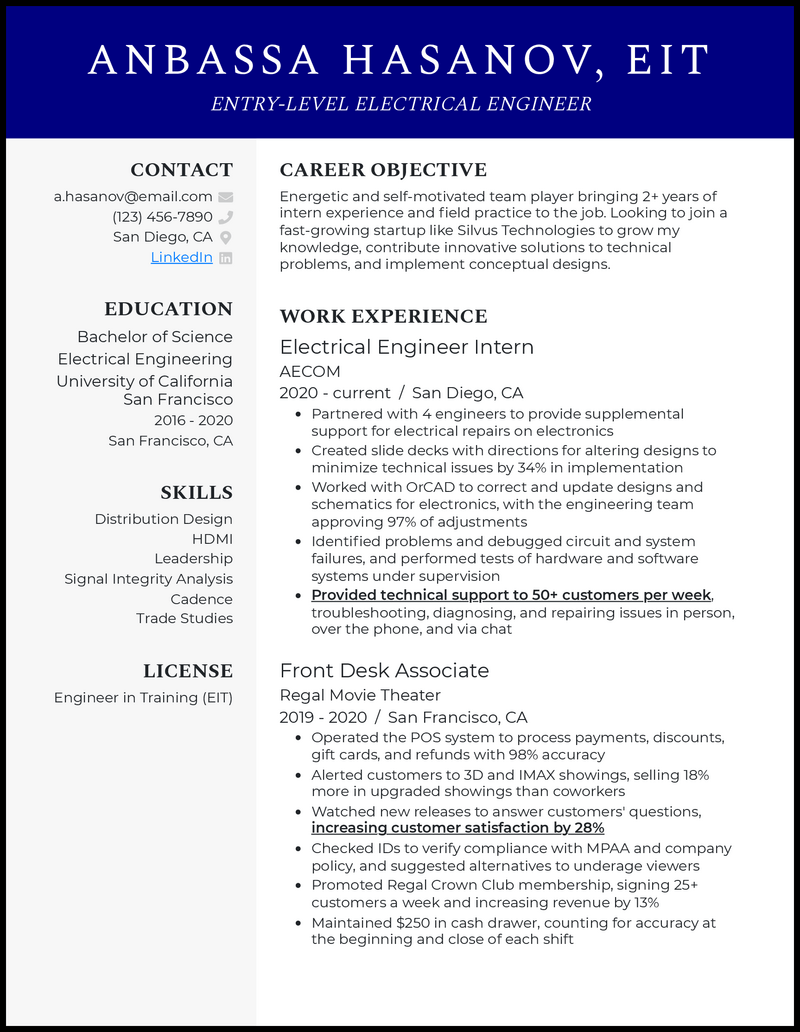As a budding engineer, you have a foundational understanding of electrical systems. Your enthusiasm to keep up with the latest developments in electrical technology and your constant drive to refine circuits make you a valuable asset to any team.
Cultivating a perfectionist mindset where you’re always on the lookout for ways to improve is key in this industry. Now, to progress your career, you’ll need to apply that same mindset to create a resume that impresses.
We’re here to make this task much less challenging. Our sample entry-level electrical engineer resume examples and resume tips will help you start your career with a bang!
Why this resume works
- We know that setting out in the professional world can be downright scary (think walking through an overgrown graveyard in the middle of the night). Presenting an entry-level electrical engineer resume that shows you’re armed and ready is an excellent trick to curry favor with recruiters.
- How about you capitalize on a job-relevant internship role that, for instance, saw you provide technical support to over 50 customers every week? Then, include your Engineer in Training license, like a backstage pass, and complement it with a career objective section that shines the spotlight on your drive and good intentions—you’re now a unicorn candidate!
What Matters Most: Your Engineering Skills & Background

Recruiters often use applicant tracking systems (ATS) to scan through your skills, so list your strongest and most relevant skills front and center to assure them you’re the right fit for the job.
Fortunately, electrical engineering is all about your technical knowledge and expertise using software and tools that help you get the job done. That should make filling out this section pretty easy. Simply prioritize your trade-specific knowledge, such as your mastery of ETAP or your deep knowledge of electromagnetic theory.
In a role as technical as yours, it’s best to leave your soft skills out for now. You can show that you’re an excellent communicator and quick learner through the cover letter instead.
9 most popular entry-level electrical engineer skills
- Circuit Analysis
- Matlab
- Simulink
- AutoCAD Electrical
- Safety Standards
- Systems Design
- Troubleshooting
- Technical Writing
- Schematic Reading
Sample entry-level electrical engineer work experience bullet points
Since you’re just getting started with your career, you may feel like you don’t have many achievements to speak of just yet. Don’t worry, though—you already have plenty of points for your resume and the interview.
Think of instances where you made an impact by putting your skills to work. This could be anything from on-the-job experience as an electrical engineer intern to working on a trade school or college project.
To magnify the impact of your experience, include quantifiable metrics where possible. For instance, instead of just saying you troubleshot electrical issues, show recruiters your value by saying you “troubleshot 10+ issues weekly, reducing total system downtime by 30%.”
Here are a few sample work experience bullet points to get you started:
- Participated in an internship project to design and develop a control system, reducing system response time by 28%
- Presented a cost-saving proposal for project materials, reducing expenses by 13%
- Managed meticulous documentation for electrical design, improving record accuracy by 27%
- Utilized AutoCAD Electrical to revise electrical systems, improving design accuracy by 23%
Top 5 Tips for Your Entry-Level Electrical Engineer Resume
- Go all-in on your technical proficiencies
- Don’t be afraid to get into the specifics of your technical expertise and how you used it to make an impact. As an example, instead of just saying you’re familiar with PSpice, talk about how you used it to perform simulations, optimizing circuit performance by 20%.
- Highlight your certifications
- If you have any engineering-specific certifications, such as an Engineer in Training (EIT) certification or a Certified Professional Engineer (PE) license, list them prominently in your resume. While most entry-level roles won’t require them, they can show your commitment and help set you apart.
- Fine-tune your resume to each role
- Read each job description carefully, identify the main focus of each role, and then reflect that in your resume. For instance, if a role emphasizes technical writing and schematic reading, highlight your experience writing electrical design documentation and using AutoCAD to manage schematics.
- Spotlight your teamwork
- Show off your ability to work well in a team by highlighting instances where your collaboration or leadership made an impact on a project. Need an example? You could talk about the cross-functional team project you worked on to integrate a new power system.
- Talk about your academic achievements
- Your education adds weight to your resume—especially now that you’re at the beginning of your career. Try and highlight the achievements most closely related to the job you’re applying for—for instance, if a job emphasizes Matlab, mention how you simulated various dynamic systems for your undergraduate research project.
Including a career objective for an entry-level electrical engineer role can be a good idea. Make sure you express how the company’s mission resonates with you personally, and include an example long-term career path that you’d like to follow within the company.
Your cover letter is a great opportunity to elaborate on your past experience and education. For instance, dive into the challenges you faced in your internship project simulating electromagnetic fields with ANSYS Electromagnetic Suite, and how you overcame them.
Show that you’re a keen thinker by discussing instances where you effectively identified and resolved issues with electrical systems. For example, talk about how you used PSpice to troubleshoot circuit behavior, identify inefficiencies, and boost system reliability by 15%.








